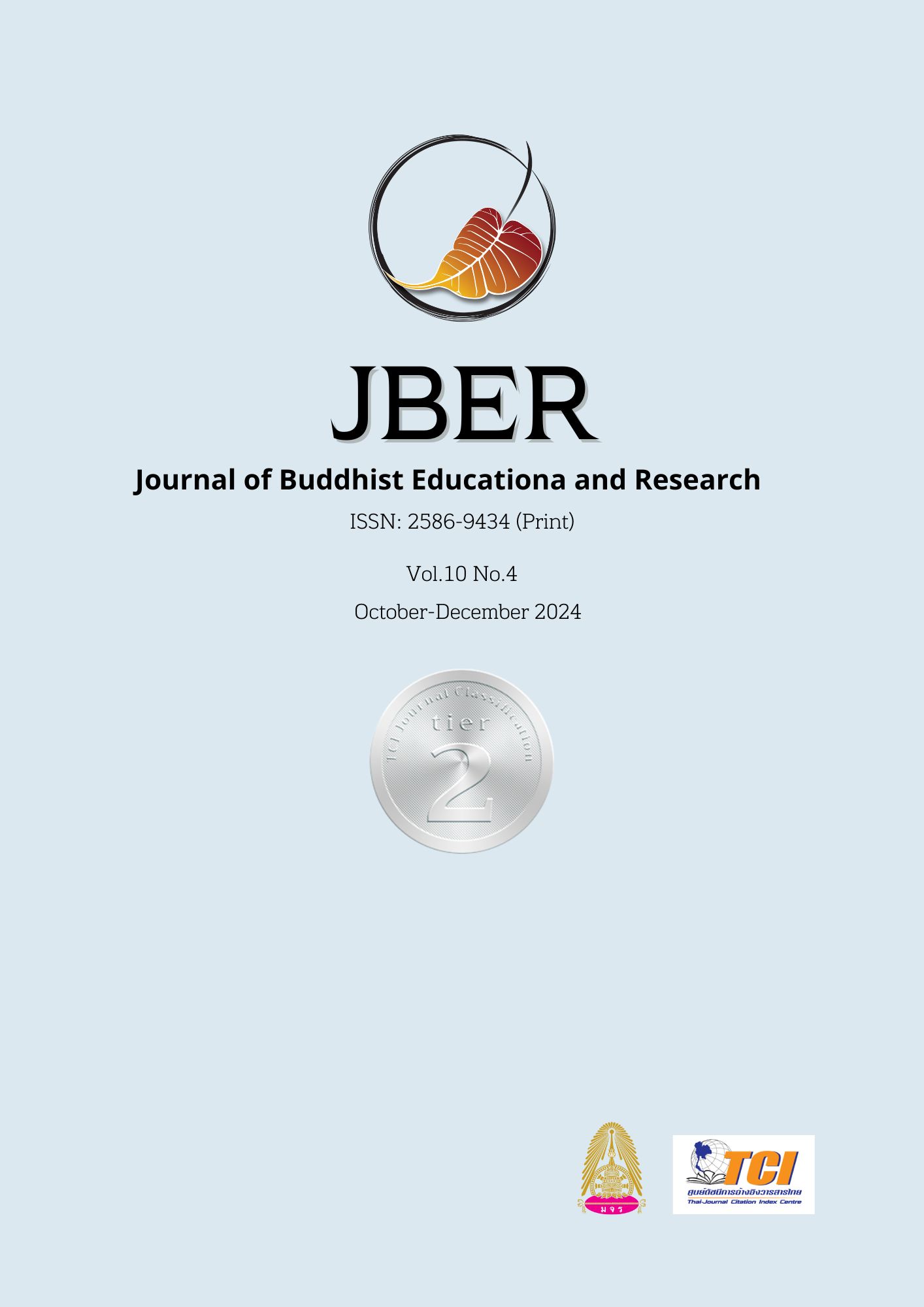The Development of Learning Achievement in Thai Poetry Writing for Matthayomsuksa 2 Students Through a Cooperative Learning Model Using Team Games Tournament with Board Games
Keywords:
The learning management approach using cooperative learning through Team Games Tournament, Board game, learning achievementAbstract
This research aimed to 1) develop and evaluate the efficiency of a cooperative learning model using the team games tournament with board games; 2) to compare the learning achievement in Thai poetry writing of Matthayomsuksa 2 students between an experimental group learn through the cooperative learning model using team games tournament with board games and a control group using traditional teaching method; and 3) investigate the satisfaction of Matthayomsuksa 2 students with the cooperative learning model using the team games tournament and board games. The sample group consisted of 73 Matthayomsuksa 2 students from the first semester of the 2024 academic year at Yantakhaw Rat Chanuphatham School, selected through simple random sampling. The research instruments included: 1) Board games; 2) Learning management plans using the cooperative learning model with team games tournament and board games; 3) Learning management plans using traditional teaching method; 4) Achievement tests on the topic of Thai poetry writing; and 5) A student satisfaction questionnaire. Data were analyzed using mean, standard deviation, and independent samples t-test. The results revealed that: 1. The cooperative learning model using team games tournament with board games had an efficiency index of 82.47/85.87. 2. The experimental group, which learned through the cooperative learning model using team games tournament and board games, achieved significantly higher learning outcomes than the control group, with a statistically significant difference at the 0.05 level. 3. The students expressed a very high level of satisfaction with the learning management system. (M = 4.80, S.D. = 0.15)
References
กิ่งกาญจน์ บูรณสินวัฒนกูล. (2562). การพัฒนาสื่อสารเรียนรู้บอร์ดเกมการศึกษาเพื่อส่งเสริมความสามารถการเรียนรู้ในรายวิชาพัฒนาการแบบเรียนภาษาไทยและความสุขในการเรียนรู้สำหรับนิสิตระดับปริญญาตรี. มหาวิทยาลัยศรีนครินทรวิโรฒ.
กระทรวงศึกษาธิการ.(2551). หลักสูตรแกนกลางการศึกษาขั้นพื้นฐาน พุทธศักราช 2551.กรุงเทพฯ : ชุมนุมสหกรณ์การเกษตรแห่งประเทศไทย.
ฉัตรกมล ประจวบลาภ. (2559). Game-Based Learning กับการ พัฒนาการเรียนการสอนทางการพยาบาล. วารสารกองการ พยาบาล, 43(2), 127-136.
ญาติมา ลิ้มสิทธิกูล. (2560). การจัดการเรียนรู้โดยใช้ทฤษฎีการสร้างองค์ความรู้ด้วยตนเองร่วมกับ การจัดการเรียนรู้แบบร่วมมือแบบ TGT วิชาคณิตศาสตร์ เรื่อง ฟังก์ชันกำลังสอง นักเรียนชั้นมัธยมศึกษาปีที่ 4. กรุงเทพฯ : มหาวิทยาลัยรามคำแหง.
ฐิติพล ขำประถม. (2558). เกมกระดานเป็นกิจกรรมที่ถูกออกแบบมาเพื่อความสนุกสนาน. กรุงเทพฯ: สำนักพิมพ์การศึกษา.
ปัญสุธา ย่องลั่น. (2557). ผลของการใช้แบบฝึกทักษะการเขียนกลอนสุภาพในวิชาภาษาไทย ชั้นประถมศึกษาปีที่ 6 โรงเรียนวัดโพธาราม อำเภอนาหม่อม จังหวัดสงขลา. (วิทยานิพนธ์ศึกษา ศาสตรมหาบัณฑิต สาขาวิชาหลักสูตรและการสอน, มหาวิทยาลัยหาดใหญ่).
ไพฑูรย์ อนันต์ทเขต. (ม.ป.ป.). เรื่องราวที่น่าสนใจเกี่ยบกับ Game-Based Learning. เรียกใช้ เมื่อ 8 กุมภาพันธ์ 2563 จาก สถาบันการเรียนรู้มหาวิทยาลัยเทคโนโลยีพระจอมเกล้า ธนบุรี:https://celt.li.kmutt.ac.th/km /index.php/game-based-learning/
ภูวภัทร อ่ำองอาจ. (2561). ผลกระทบของการจัดการเรียนรู้แบบร่วมมือโดยใช้เทคนิค TGT ต่อเจตคติและผลสัมฤทธิ์ทางการเรียนของนักเรียนในจังหวัดเรียว ประเทศอินโดนีเซีย.
วิไลลักษณ์ แก้วกระจ่าง. (2557). การเพิ่มทักษะการเขียนด้วยชุดแบบฝึกโครงเรื่องThe Writing Ability Enhancement by Using the Conceptual Plot. มหาวิทยาลัยเทคโนโลยีราชมงคลสุวรรณภูมิ.
สำนักวิชาการและมาตรฐานการศึกษา. (2553). ชุดฝึกอบรมการวัดและประเมินผลการเรียนรู้หลักสูตรแกนกลางการศึกษาขั้นพื้นฐาน พุทธศักราช 2551. กรุงเทพฯ : โรงพิมพ์ชุมนุมสหกรณ์การเกษตรแห่งประเทศไทย.
Bloom,Benjamin S. (1976). Human characteristicsb and school learning. New York: Mc Graw-Hill.
Ledford, B.R. and Sleeman, P.J. (2002) Instructional Design : System Strategies. Greenwich, Conn: Information Age.
Lekcharoen, S, & Chaisri, N. (2021). Causal factors affecting purchase intention fashion product on Instagram of consumers in Thailand. Journal of Arts Management, 5(2), 513–528.
McMillan, J. H. (1996). "Educational Research: Fundamentals for the Consumer". New York: HarperCollins.
Treher, J. (2012). European Framework for CLIL teacher education. Synergies Italie, n(8),105-116.
Downloads
Published
How to Cite
Issue
Section
License
Copyright (c) 2024 Journal of Buddhist Education and Research (JBER)

This work is licensed under a Creative Commons Attribution-NonCommercial-NoDerivatives 4.0 International License.





